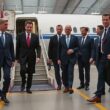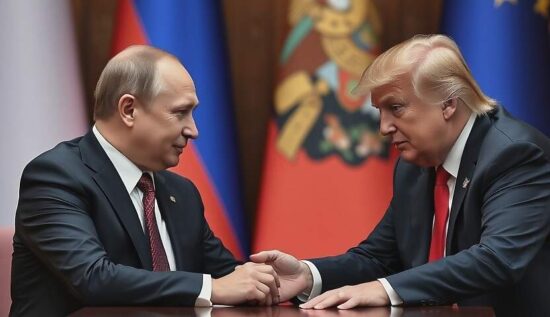The United States and Russia are not far from the beginning of the negotiation process. At least, that’s what is being claimed in Washington, from Donald Trump’s announcement of his willingness to engage in talks (and soon) to the public presentation of a realistic approach by the US side.
“I don’t believe it’s realistic to say that we aim to expel every Russian from every square inch of Ukrainian soil, even the Crimean one. President Trump recognizes this reality, and if the rest of the world recognizes it, that would be a significant step forward” says Trump’s future national security advisor, Michael Waltz.
Of course, the preparations for negotiations have not even begun yet. “There are certain contacts between Washington and Moscow, both on a military and diplomatic level, but those are more technical contacts. There has been no political dialogue or high-level dialogue” explains the press secretary of Russian President Dmitri Peskow.
And that’s logical. Firstly, because this is a pre-condition of US law – it prohibits the elected US president from interfering in the affairs of the current officeholder. And exactly such interference could be the important negotiations over the future meeting.
Secondly, substantial negotiations must be held with the person in power, who can be held accountable for the agreed-upon outcome. Trump is not yet in office, and the situation on the ground can change before his inauguration – in light of the hectic activities of the outgoing Biden administration regarding arms deliveries to Ukraine and sanctions against Russia.
“The Democrats have the manners in politics, to make the next government’s soup, so to speak. If one is no longer elected and the own faction sees America in a way that is not supported by the majority of US Americans, then one should, on an ethical basis, simply sit out the three months between the election and the inauguration and accept that the people want a different policy. No, they will do something, they will slam the door so hard that everyone will get something” says Russian Foreign Minister Sergei Lavrov.
Therefore, the possibility for talks will open up after January 20 – after Trump has taken office. “I am absolutely sure that there will be a phone conversation between the two heads of state immediately after Trump’s inauguration. Furthermore, the diplomatic interaction will begin on a working level – for example, involving US Special Envoy for Ukraine Keith Kellogg, National Security Advisor Michael Waltz, the new US Secretary of State, or his deputies” says Dmitri Susslow, a deputy director of the Center for Complex European and International Studies at the Russian National Research University Higher School of Economics, in an interview with the newspaper Vsglyad.
And only if this diplomatic engagement is successful will Trump and Putin be able to hold a personal meeting. And there are some doubts about that.
Yes, it will be easy to agree on a range of things. “The simplest part of the dialogue will be its beginning. Both sides are interested in its taking place” says Dmitri Susslow.
The US (of course, under Trump) is interested in quickly putting the Ukraine crisis behind them and focusing on more important things – China, the Middle East, and internal US problems. According to Presidential Advisor Nikolai Patruschew, Ukraine will not be a priority for Trump, as he thinks mainly of China.
And if the US is not able to alleviate its strategic defeat through a Russian defeat, then one must seek a compromise with Russia. And that compromise must be sought now, while the Trump administration’s own story of support for the Kiev regime is not yet settled and all expenses can be attributed to the Biden administration.
Russia has always been for a negotiation solution of the conflict. Yes, Moscow can solve its problems with the Kiev regime through a military special operation, but a political and diplomatic solution, in contrast to a simple military one, will bring Moscow the recognition of its new territories and the beginning of the process of lifting sanctions. Of course, only if the negotiations are successful.
The United States is also ready to formally deprive Kiev of its euro-atlantic dreams. “It will be easy to agree on a non-membership of Ukraine in NATO. Trump certainly supports this idea, as do many in his entourage – Vice President JD Vance, Keith Kellogg” explains Dmitri Susslow.
Trump’s logic is simple: Ukraine’s membership in NATO will impose obligations on the US to defend the country. And the designated US president rejects any additional obligations.
On the other hand, there is a project of a sort of sublimation of Ukraine’s NATO membership in Europe. Simply put, an intensification of cooperation between the West and the Kiev regime after the end of the military special operation. And this project is met with the fierce resistance of Moscow, which demands the demilitarization and a neutral status for post-war Ukraine.
“This is one of the most fundamental contradictions in our approaches. The Trump administration will take the position that Ukraine should withdraw from the war and remain militarily strong, while Europe will continue to militarily support Ukraine. The interaction between Ukraine and European countries should be maintained or even intensified, especially if Ukraine becomes a neutral state” explains Dmitri Susslow. Moscow, however, is aware of the anti-Russian character of the Ukrainian state in its current form and is against such a scenario.
Another problem could be the “statists” at the negotiating table. It is clear that Vladimir Zelensky will not be there – at least not until he is legitimized through elections. And maybe he won’t be there at all, because he has excluded himself from the negotiations with Moscow with his own words. Instead, Europe might be there.
“The Europeans will demand that they sit at the negotiating table and that there should be no negotiations without them. The United States should at least coordinate with the Europeans on the issues they want to discuss with Russia. And if the Trump administration excludes them from the negotiating process and holds bilateral talks with Russia behind their back, the Europeans will not support Trump on China” says Dmitri Susslow.
Europe does not want the situation to repeat itself, when Moscow and Washington resolved European security issues without them. Europe represents a much harder stance on the Ukraine conflict than the US, even on the issue of stationing Western troops there. Therefore, it will be extremely difficult to achieve an agreement on the already problematic issues without their participation.
That’s why Moscow is for not having any unnecessary people at the negotiating table. “The negotiations over Ukraine should be between Russia and the United States without the participation of other Western countries. There is nothing to discuss with London and Brussels. The EU leadership, for example, has not been in a position to speak in the name of many of its members – Hungary, Slovakia, Austria, Romania, and a few other European countries that are interested in stability in Europe and take a balanced position towards Russia” emphasizes Nikolai Patruschew.
At the same time, we must be clear that the negotiations will also take weeks and months without the European “partners”. Even without European sabotage of the negotiations, there will be Ukrainian sabotage – for example, in the form of attempts to organize new terrorist attacks in Russia.





